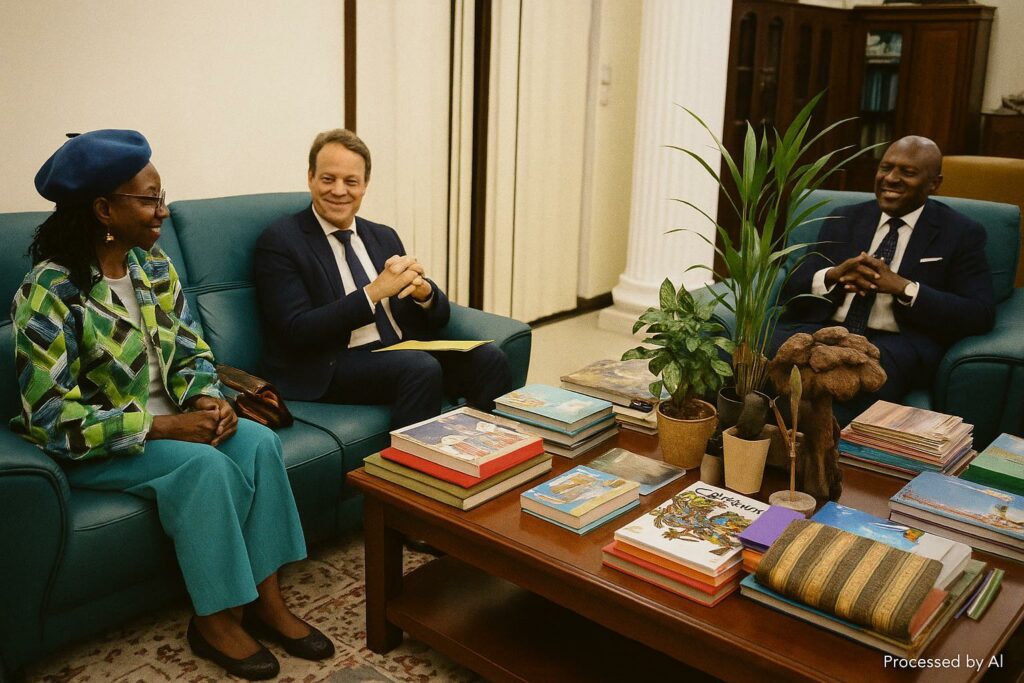A Convergence of Diplomatic Timelines
When Ambassador Enrico Nunziata walked into the Ministry of Posts, Telecommunications and the Digital Economy on 22 July, he carried more than a courtesy note; he brought a blueprint for a new layer of Italian-Congolese engagement. Only weeks earlier, on 16 June, Brazzaville and Rome had initialled a memorandum of understanding designed to accelerate Congo-Brazzaville’s digital transition. By choosing the republic as a pilot country for its broader Mattei Plan, Italy signalled that digital cooperation is no longer an ancillary element of foreign policy but a tangible instrument of economic statecraft (Italian MFA, 2024).
Inside the Architecture of the Mattei Plan
Named after Enrico Mattei, the visionary who reshaped Italy’s post-war energy strategy, the plan extends Rome’s diplomatic repertoire beyond hydrocarbons. Its African chapter foresees support to as many as half a million start-ups over the next decade, with Congo-Brazzaville serving as an early test case. The focus on artificial intelligence, logistics optimisation and agri-tech dovetails with Brazzaville’s National Development Plan 2022-2026, which elevates the digital economy to a pillar of diversification. Italian officials privately underline that the initiative is designed to complement, rather than compete with, existing European Union frameworks, allowing Rome to cultivate bespoke partnerships while still reinforcing continental objectives.
UNDP’s Technical Handshake
The presence of UNDP Resident Representative Adama Dian Barry at the July meeting lent operational gravitas. The agency’s Digital Center of Excellence in Rome is expected to second experts to Brazzaville and to contract, by month’s end, an international consultancy to draft Congo’s inaugural National Artificial Intelligence Strategy (UNDP, 2023). The blueprint will likely map regulatory safeguards, data-protection norms and incentives for research consortia, ensuring that the technology’s deployment aligns with both national sovereignty and global best practice.
Opportunities across Strategic Sectors
Health authorities anticipate that machine-learning tools could refine epidemiological surveillance along the Congo River basin, where rapid detection of waterborne outbreaks remains paramount. In agriculture, predictive analytics promise to mitigate climate-related crop volatility, an element with direct implications for food security and rural livelihoods. The logistics corridor linking Pointe-Noire and Brazzaville, already a lifeline for sub-regional trade, stands to gain from real-time freight-tracking solutions. Each application amplifies the government’s stated objective of leveraging technology to foster inclusive growth while reducing dependence on raw-commodity cycles.
Human Capital at the Core
Minister Léon Juste Ibombo argues that investment in physical infrastructure must be matched by investment in people. The accord therefore earmarks resources for coding academies, start-up accelerators and public-private research clusters. Italy’s Polytechnic network has offered to host exchange programmes for Congolese engineers, while local universities are reviewing curricula to embed AI ethics and cybersecurity modules. The expectation is that a generation of ‘digital diplomats’ will emerge—individuals fluent in both programming languages and the subtleties of international negotiation.
Navigating Implementation Realities
Even the most enthusiastic officials concede that obstacles persist. Fibre-optic penetration outside major cities is uneven, and bureaucratic lead times can temper entrepreneurial momentum. Yet, the phased structure of the Mattei Plan offers built-in course corrections, with biannual joint-monitoring committees and metrics tied to start-up survival rates and job creation. Financially, Rome’s package blends concessional lending with grant components, limiting debt exposure while aligning with Congo’s prudent-borrowing guidelines endorsed by multilateral lenders.
A Calculated Geopolitical Dividend
For Brazzaville, the partnership reinforces its reputation as a diplomatic bridge-builder, preserving balanced ties with multiple external actors. For Rome, it secures an early-mover advantage in Central Africa’s emergent tech landscape and projects soft-power credentials conducive to broader security cooperation in the Gulf of Guinea. The confluence of national priorities thus renders the digital dossier more than a technical exercise; it becomes a vector of mutual reassurance and strategic visibility.
Outlook for a Digitally Enabled Future
Should the roadmap unfold as drafted, Congo-Brazzaville could graduate within five years from consumer of imported solutions to regional supplier of home-grown digital services. The anticipated spin-offs—ranging from higher-value exports to data-driven public administration—align with President Denis Sassou Nguesso’s call for ‘transformative pragmatism’ in economic governance. Italy’s commitment, paired with multilaterally backed capacity-building, positions both nations to claim a tangible win in the evolving geometry of Africa-Europe relations.

